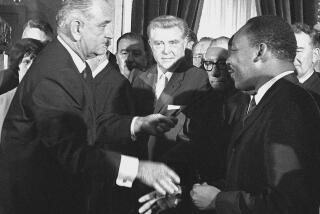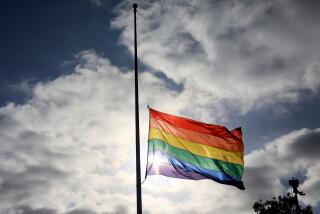On civil rights, a mix of backlash and progress
Jasmyne Cannick didn’t join the folks in West Hollywood celebrating the gay marriage victory handed down by the Supreme Court this week.
She was too busy mourning the assault on minorities’ voting rights the court unleashed the day before.
Cannick is a lesbian. She’s also black. “And I didn’t feel like dancing for joy,” she said.
She’s not alone in feeling conflicted. For many people, including me, the high court’s flurry of recent rulings feels like one big step forward on civil rights, and a whole lot of shuffling back.
The day before the court expanded gays’ rights to marry, it gutted the Voting Rights Act. That gives new life to old efforts to suppress minority turnout by freeing Southern states with a history of voter discrimination from strict federal oversight.
In the weeks before that, the court toughened standards for college affirmative action programs that promote diversity; made it harder for employees to challenge workplace discrimination, harassment and firings; and narrowed constitutional protections against self-incrimination, extending law enforcement’s reach.
I understand why the gay marriage rulings seem to get all the ink. The rejection of Proposition 8 and the federal law limiting same-sex marriage represents a powerful beachhead in the battle for equality.
The repeal of the Defense of Marriage Act is fundamental to the gay battle for equality in the way that Brown vs. the Board of Education was to blacks: no more separate-but-equal tracks.
The voting rights rollback is a mere whisper alongside that roar. But it’s also a warning that the gay community would be wise not to ignore.
::
This week has been a reminder that civil rights struggles always involve a humbling mix of backlash and progress.
Remember the election in November 2008? This country was broad-minded enough to elect a black man president, while California, its most populous state, was rewriting its Constitution to keep marriage off-limits for gays and lesbians.
I felt proud of my nation and ashamed of my state.
I saw that same confusion reflected this week on my Facebook page, among friends both gay and straight. “I feel like my country’s giving me whiplash,” read one post. I clicked ‘like’ on that.
Some groused about being guilt-tripped by protests of the voting rights rollback at a time when they were reveling in the gay marriage rulings. “We have waited so long for this. Can’t we just enjoy the party?”
And some privately pointed out that blacks haven’t been particularly good foxhole buddies. Strong support among socially conservative, churchgoing black voters helped California’s measure banning gay marriage to pass.
But black resistance to gay marriage has softened since then, as it has in just about every state and among every demographic.
When the federal Defense of Marriage Act passed in 1996, only one quarter of Americans thought same-sex marriage should be allowed. That had risen to about one-third by the time California voted down gay marriage in 2008. Now, just five years later, more than half of Americans approve, and California will be the 13th state to allow gays to wed.
“For a long time, it was perceived by [black] people that this whole gay rights thing was a white issue,” said Cannick.
The public face of the gay rights movement is still mostly male, middle-class and white. “But I see young gay people outside Dorsey High walking down the street holding hands,” Cannick said. “Black and Latino. All rainbowed out. And comfortable about it.
“People have finally got it through their heads, this is [about] their grandson, their sister, their daughter,” she said.
“And the white gay community has to understand that civil rights are about more than marriage.”
::
Michael Kearns is part of that white, gay community. But at 63, he’s been an activist long enough to know that civil rights isn’t a zero-sum game.
“I remember the ‘70s,” he said. “Feminism, the gay revolution, civil rights — all mixing in some profound way to support our progress.
“No matter how much celebrating you do,” he said, “your mind does not go blank in terms of others’ suffering.”
Because progress can come with its own sort of peril. That was on display in the voting rights verdict.
It must be hard to consider black voters disenfranchised when we have a black president and record black voter turnout. At least that’s the view the Supreme Court majority took. It’s a new South, Chief Justice John Roberts said, and we need standards that have evolved to reflect where we are.
But where we are depends on what you choose to see. Maybe we ought to look at Barack Obama but listen to Paula Deen, who seemingly couldn’t fathom why the N-word is offensive because she has heard it used so freely.
Her hometown, Albany, Georgia, was scolded when Congress last approved the Voting Rights Act in 2006 for trying to impose a redistricting plan that would have squashed black voting power.
That shows that progress can be both illusory and fragile.
And we may have to count on those rainbowed-out kids to not just protect our voting rights, but to bring the other 37 states around on gay marriage.
More to Read
Start your day right
Sign up for Essential California for news, features and recommendations from the L.A. Times and beyond in your inbox six days a week.
You may occasionally receive promotional content from the Los Angeles Times.






